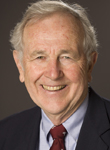For heavenly radiance, Burns wins Brouwer Award
By Blaine Friedlander

Citing research that has transformed our scientific view of the heavens, the American Astronomical Society (Division of Dynamical Astronomy) will give Joseph A. Burns, Ph.D. ’66, the Irving P. Church Professor of Engineering and professor of astronomy, the prestigious 2013 Dirk Brouwer Award. The presentation will take place in Philadelphia in May 2014.
The society cited Burns’ fundamental contributions in planetary dynamics and exceptional record of scientific achievement. With Victor Safronov in 1973, Burns wrote a seminal paper that quantified how collisions affect the rotational properties of asteroids.
Burns’ 1979 paper, “Radiation Forces on Small Particles in the Solar System,” illuminated the importance of radiation forces in the dynamics of small bodies, and changed the understanding of the motion of interplanetary dust and asteroids. This work is the foundation for the Yarkovsky and YORP effects that explain the rotation and shapes of small, cosmic bodies. It remains the second-most highly cited papers in the journal Icarus, with more than 900 citations to date.
The society said that he “made impressive contributions to the interpretations of planetary ring-structures” about Jupiter and Saturn using Voyager, Galileo and Cassini spacecraft observations, and clarifying the role of magnetic fields and resonance dynamics. Beyond his scientific achievements, Burns edited the texts “Planetary Satellites” (1977) and “Satellites” (1986), and was the editor of Icarus for almost 20 years.
At Cornell, Burns has served as chair of Theoretical and Applied Mechanics (1987-1992), vice provost for physical sciences and engineering (2002-2007). He currently is dean of the university faculty (2012-present).
The award is named for the Dutch-American astronomer who edited the Astronomical Journal from 1941 to 1966.
Media Contact
Get Cornell news delivered right to your inbox.
Subscribe